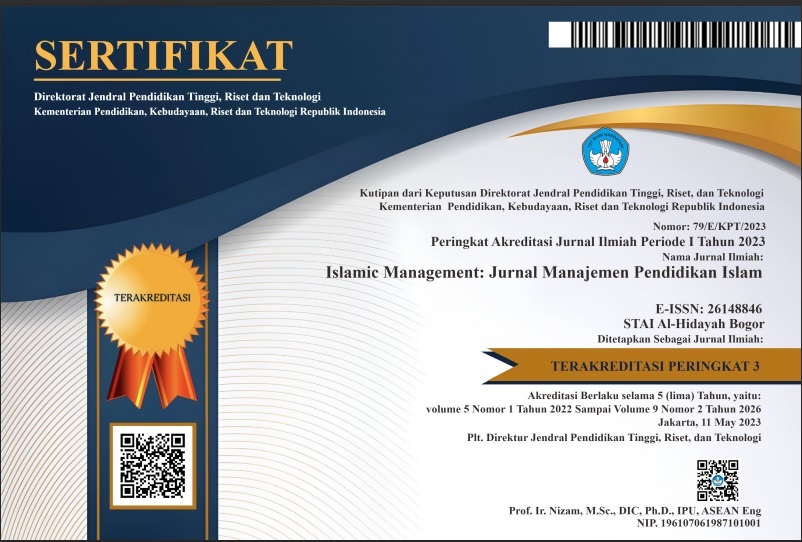TIPS FOR ACHIEVING SUCCESS ACCORDING TO THE BOOK (MIFTAH AL-NAJAH BY AID AL-QARNI)
DOI:
https://doi.org/10.30868/im.v8i01.8307Keywords:
Practice, society, Religion, CoastalAbstract
This study uses a qualitative research method with a character study approach that is included in the category of library research. A descriptive-analytical approach is used to describe the steps to achieve success, as well as the characteristics of successful people according to Aid al-Qarni's views. The results of the study show Aid al-Qarni's career journey and thoughts in the fields of education, preaching, and Islamic literacy. Aid al-Qarni has made great contributions through his works that have inspired many people. Furthermore, discussing the steps to achieve success as explained in Miftah al-Najah which emphasizes sincerity, discipline, and wise use of time as the keys to success. In addition, the characteristics of successful people according to Aid al-Qarni include strong faith, hard work, and concern for others. Through a combination of spiritual and moral values, individuals can achieve true success that is not only worldly, but also brings blessings. Therefore, educational institutions are advised to integrate Islamic success values into the curriculum, workers and business actors apply Islamic ethics, and society instills a culture of hard work and social concern.
References
Anton, Firdaus, Idma, Iskandar, Muhammad Hisyam, Nahrowi, A. Yasin, & Muttaqin, Zamzam. (2024). Meraih Kesuksesan Dengan Semangat Mencari Ilmu (Achieving Success with the Spirit of Seeking Knowledge). JIC : Jurnal Intelek Insan Cendikia, 1(1), 1504–1513.
Aqbar, Khaerul, Iskandar, Azwar, & Yunta, Akhmad Hanafi Dain. (2020). Konsep Al-Falah dalam Islam dan Implementasinya dalam Ekonomi. BUSTANUL FUQAHA : Jurnal Bidang Hukum Islam, 1(3), 516–531. https://doi.org/10.36701/bustanul.v1i3.206
Dahlia, Berliani, Indah, Choirina, Annisa, Annisa, Mega, & Wismanto. (2024). Menafsirkan Kunci Kesuksesan Dari Al-Qur’an. JMPAI : Jurnal Manajemen Dan Pendidikan Agama Islam, 2(2), 14–26. https://doi.org/10.61132/jmpai.v2i2.67
Dalimunthe, M. A. (2022). "Keterampilan Komunikasi Antarbudaya Mahasiswa Malaysia di Kota Medan." Langgas: Jurnal Studi Pembangunan 1(2): 82-89.
Dalimunthe, M. A., A. M. Syam, A. Suhendar, and N. M. Al-Mujtahid. (2024). "Deconstructing Islamic Cyberculture: Mitigating Inferiority and Cancel Culture in Virtual Space." OPINI: Journal of Communication and Social Science 1(2): 12-26.
Dalimunthe, M. A., H. Pallathadka, I. Muda, D. Devi Manoharmayum, A. Habib Shah, N. Alekseevna Prodanova, M. Elmirzayevich Mamarajabov, and N. Singer. (2023). "Challenges of Islamic Education in the New Era of Information and Communication Technologies." HTS Teologiese Studies / Theological Studies 79(1). https://doi.org/10.4102/hts.v79i1.8608.
Harahap, Syahrin. (2011). Metodologi Studi Tokoh Pemikiran Islam. Jakarta: Prenada Media Group.
Humaizi, Hasan NNN, M. A. Dalimunthe, and E. Ramadhani. (2024). "Harmony in Virtual Space: Forum Kerukunan Umat Beragama (FKUB) Development Communication in Creating Digital Literacy Based on Religious Moderation." Journal of Infrastructure, Policy and Development 8(7): 4299. https://doi.org/10.24294/jipd.v8i7.4299.
Husna, Syuhadatul, Hikmah, Nurul, & Sari, Herlini Puspika. (2024). Relevansi Filsafat Pendidikan Islam dengan Tantangan Globalisasi dalam Pembentukan Karakter Muslim. Hikmah : Jurnal Studi Pendidikan Agama Islam, 1(4), 8–20.
Indainanto, Y. I., M. A. Dalimunthe, H. Sazali, Rubino, and S. Kholil. (2023). "Islamic Communication in Voicing Religious Moderation as an Effort to Prevent Conflicts of Differences in Beliefs." Pharos Journal of Theology 104(4). https://doi.org/10.46222/pharosjot.104.415.
Patton, M. Q. (2009). Metode Evaluasi Kualitatif. Yogyakarta: Pustaka Pelajar.
Rohmah, Noer. (2018). Integrasi Kecerdasan Intelektual (IQ), Kecerdasan Emosi (EQ) Dan Kecerdasan Spiritual (SQ) Dalam Meningkatkan Etos Kerja. Tarbiyatuna, 3(2), 77–102.
Shohib, Muhammad, & Sa’diyah, Kholifatus. (2023). Kriteria Sukses Dalam Al-Qur’an (Kajian Tematik). Jurnal Ilmu Pendidikan Dan Sosial (JIPSI), 2(1), 53–61. https://doi.org/10.58540/jipsi.v2i1.192
Sikumbang, A. T., M. A. Dalimunthe, S. Kholil, and N. F. Nasution. (2024). "Digital Da'wah Indonesia Ulema in the Discourse of Theology." Pharos Journal of Theology 105(1): 1-14. https://doi.org/10.46222/pharosjot.1051.
Sinta, Sari Dewi, Aminah, Siti, Safitri, Mutia, Andriani, Amelia Putri, & Wismanto. (2024). Sudut Pandang Islam Tentang Perjalanan dan Tujuan Hidup Manusia. IHSANIKA : Jurnal Pendidikan Agama Islam , 2(1), 190–201.
Sugiyono. (2023). Metode Penelitian Kuantitatif, Kualitatif, dan R&D (Edisi Revisi) (Edisi Revi). Bandung: Alfabeta.
Syam, A. M., M. A. Dalimunthe, A. Suhendar, and R. F. A. K. Rambe. (2024). "Islamic Philosophy: A Comparative Perspective Between Ibnu Khaldun and Karl Marx." SYAHADAT: Journal of Islamic Studies 1(2): 55-72.
Downloads
Published
How to Cite
Issue
Section
Citation Check
License
Copyright (c) 2025 Aisyah Firdaus, Yusnaili Budianti, Mohammad Alfarabi

This work is licensed under a Creative Commons Attribution-ShareAlike 4.0 International License.
Authors who publish with this journal agree to the following terms:
- Authors retain copyright and grant the journal right of first publication with the work simultaneously licensed under a Creative Commons Attribution License that allows others to share the work with an acknowledgment of the work's authorship and initial publication in this journal.
- Authors are able to enter into separate, additional contractual arrangements for the non-exclusive distribution of the journal's published version of the work (e.g., post it to an institutional repository or publish it in a book), with an acknowledgment of its initial publication in this journal.
- Authors are permitted and encouraged to post their work online (e.g., in institutional repositories or on their website) prior to and during the submission process, as it can lead to productive exchanges, as well as earlier and greater citation of published work (See The Effect of Open Access).






